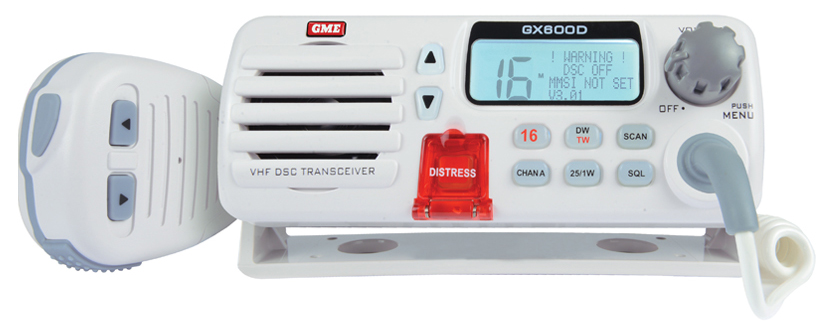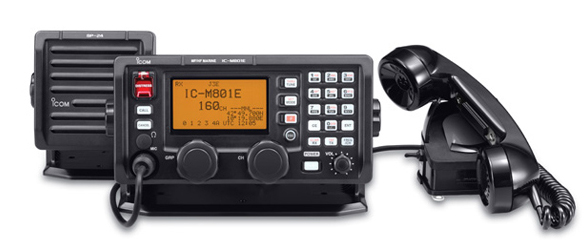If you're planning to buy or have already bought a boat, you'll need to get a Marine Radio Licence to operate any communications equipment onboard your new vessel - including VHF, MF, and HF Radios.
ABC Sydney can get you a Marine Radio Licence fast, whether you need to get a Short-Range Operator Certificate of Proficiency (SROCP), or a Long-Range Operator Certificate of Proficiency (LROCP).
It's a great option to pursue after completing your General Boat Licence Course, and will ensure that you can safely operate the Radio in case of an emergency.
The Marine Radio Certificates of Proficiency never expire or need renewal, so they're yours for life, and are recognised internationally.
Marine Radio Licence Types
There are two main types of Marine Radio Licence, which cover different types of Radio. Most people need a SROCP, but it's a good idea to check which type of Radio you have first.
- 📻 SROCP | Short-Range Operator Certificate of Proficiency
- For VHF radios.
- 📣 LROCP | Long-Range Operator Certificate of Proficiency
- For MF & HF radios.
📻 SROCP: Short-Range Marine Radio

What is a VHF Radio?
A VHF Marine Radio uses Very High Frequency transmission to broadcast voice for communication between a vessel and a transceiver, which could be another boat, a handheld VHF receiver, or a station on land.
VHF Radio uses 'Channels' that allow simple broadcast frequencies to be used in Simplex (one-way) or Duplex (two-way) communication.
While the VHF Radio itself does not need to be licenced or registered with the Australian Communications and Media Authority (ACMA), the Operator of the Radio requires a Certificate of Proficiency.
Why do I need a VHF Radio Licence?
You need a VHF Radio Licence or SROCP to legally operate your VHF Marine Radio - if you don't have one, you can be fined under the Radiocommunications Act 1992 for up to 2 years imprisonment!
The Certificate of Proficiency is also required any time the vessel fitted with a Marine Radio is driven - you're legally responsible if another person is behind the wheel, even if you're not present.
The SROCP will train you on using your VHF Marine Radio safely in emergency situations, and will ensure that you're covered while out on the water.
How do I study for the VHF Radio Licence?
The best way to study for the SROCP is through the Online Short-Range Marine Radio Course.
We are offering this course in partnership with Above & Beyond Boating, and once booked you will receive login information to the course (hosted on the aXcelerate e-learning platform) within 48 hours.
This course covers all the SROCP VHF content and guides you through all the training you need to be ready for the examination.
When you've finished the course and are feeling confident, get in touch with us to book your exam.
How much does the VHF Radio Licence Course & Examination cost?
The fee is $375 and includes the Online SROCP Radio Course, the exam & practical assessment, processing, and issue of the certificate.
The VHF Radio Licence Examination Process
Examination is held during the week at our Artarmon office, please contact us to book in once you have completed the e-learning.
The first half of the examination is the SROCP test that consists of 25 multiple choice questions, with a 30 minute time limit and a pass mark of 18/25.
The second half is the Observation Checklist SROCP, a practical demonstration of the operation of a VHF Marine Radio, broadcast channel selection, and appropriate responses while broadcasting.
This practical component takes another 30 minutes, and the best way to study for it is to confidently know the theory content.
What to bring for the Examination
- Identification such as a NSW Drivers Licence (or as per RMS guidelines)
- One passport-acceptable photo (as per Australian Government guidelines)
- A black or blue ballpoint pen
📣 LROCP: Long-Range Marine Radio

What is a MF or HF Radio?
Medium Frequency (MF) or High Frequency (HF) both work very differently to a shorter-range VHF radio.
Instead of sending their signal more-or-less directly toward the receiver, a MF/HF Radio aims the transmission slightly skywards, and bounces it off the Earth's Ionosphere to return back to land - usually over the horizon.
Unlike the easy-to-use channels of VHF, MF/HF Radio requires the Operator to select the appropriate wavelength of transmission for the distance of the receiver.
Modern MF/HF Radios also support VHF broadcast, so the Long-Range LROCP covers all these different uses.
All MF/HF radios must be licenced or registered with the ACMA, which will also give it a unique call sign identifier.
Why do I need a Long-Range Radio Licence?
You need a LROCP to legally operate your MF/HF Radio - just as with VHF, you can be fined under the Radiocommunications Act 1992 for up to 2 years imprisonment or a large fine!
Due to the far longer range and relative complexity of this type of Radio, it's very important that you undergo the appropriate certification.
How do I study for the Long-Range Radio Licence?
The best way to study for the LROCP is through the Online Long-Range Marine Radio Course.
We are offering this course in partnership with Above & Beyond Boating, and once booked you will receive login information to the course (hosted on the aXcelerate e-learning platform) within 48 hours.
This course covers all the LROCP content (VHF, MF, and HF) and guides you through all the training you need to be ready for the examination.
When you've finished the course and are feeling confident, get in touch with us to book your exam.
How much does the Long-Range Radio Licence Examination cost?
The fee is $389 and includes the Online LROCP Radio Course, the exam & practical assessment, processing, and issue of the certificate.
The Long-Range Radio Licence Examination Process
Examination is held during the week at our Artarmon office, please contact us to book in once you have completed the e-learning.
The first half of the exam is 50 multiple choice questions, with a 60 minute time limit and a pass mark of 35/50.
The second half of the exam is a practical demonstration of the operation of a MF/HF radio, selecting broadcast frequencies, maydays, and DSC alerts.
This practical component takes 45 minutes, as it covers the use of a MF/HF radio as well as VHF.
What to bring for the Examination
- Identification such as a NSW Drivers Licence (or as per RMS guidelines)
- One passport-acceptable photo (as per Australian Government guidelines)
- A black or blue ballpoint pen